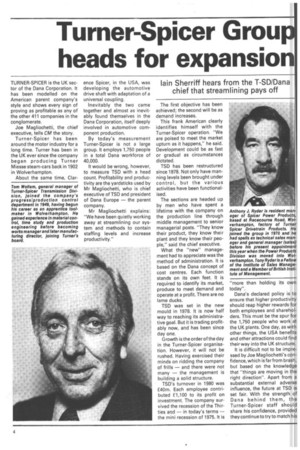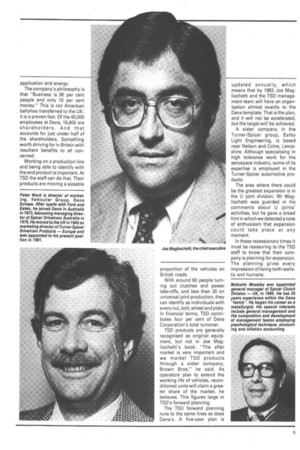Turner-Spicer Group heads for expansion
Page 36

Page 37

If you've noticed an error in this article please click here to report it so we can fix it.
lain Sherriff hears from the T-SD/Dana chief that streamlining pays off
TURNER-SPICER is the UK sector of the Dana Corporation. It has been modelled on the American parent company's style and shows every sign of proving as profitable as any of the other 411 companies in the conglomerate.
Joe Magliochetti, the chief executive, tells CM the story.
Turner-Spicer has been around the motor industry for a long time. Turner has been in the UK ever since the company began producing Turner Miesse steam-cars back in 1902 in Wolverhampton.
About the same time, Clar ence Spicer, in the USA, was developing the automotive drive shaft with adaptation of a universal coupling.
Inevitably the two came together and almost as inevitably found themselves in the Dana Corporation, itself deeply involved in automotive component production.
By today's measurement Turner-Spicer is not a large group. It employs 1,750 people in a total Dana workforce of 40,000.
It would be wrong, however, to measure TSD with a head count. Profitability and productivity are the yardsticks used by Mr Magliochetti, who is chief executive of TSD and president of Dana Europe — the parent company.
Mr Magliochetti explains: "We have been quietly working away at streamlining our system and methods to contain staffing levels and increase productivity." The first objective has been achieved; the second will be as demand increases.
This frank American clearly identifies himself with the Turner-Spicer operation. "We are poised to meet the market upturn as it happens," he said. Development could be as fast or gradual as circumstances dictated.
TSD has been restructured since 1978. Not only have manning levels been brought under control, but the various activities have been functionalised.
The sections are headed up by men who have spent a lifetime with the company on the production line through middle management to senior managerial posts. "They know their product, they know their plant and they know their people," said the chief executive.
What the "new" management had to appreciate was the method of administration. It is based on the Dana concept of cost centres. Each function stands on its own feet. It is required to identify its market, produce to meet demand and operate at a profit. There are no lame ducks.
TSD was set in the new mould in 1978. It is now half way to reaching its administrative goal. But it is trading profitably now, and has been since day one.
Growth is the order of the day in the Turner-Spicer organisation. However, it will not be rushed. Having exercised their minds on ridding the company of frills — and there were not many — the management is building a solid structure.
TSD's turnover in 1980 was £40m. Each employee contributed £1,100 to its profit on investment. The company survived the recession of the Thirties and — in today's terms — the mini recession of 1975. It is "more than holding its own today".
Dana's declared policy is to ensure that higher productivity should reap higher rewards for both employees and shareholders. This must be the spur for the 1,750 people who work at the UK plants. One day, as with other things, the USA benefits and other attractions could find their way into the UK structure.
It is difficult not to be impressed by Joe Magliochetti's confidence, which isfar from brash, but based on the knowledge that "things are moving in the right direction". Apart from a substantial external adverse influence, the future at TSD is set fair, With the strength of Dana behind them, the Turner-Spicer staff should share his confidence, provided they continue to try to match his application and energy.
The company's philosophy is that "Business is 90 per cent people and only 10 per cent money." This is not American ballyhoo transferred to the UK; it is a proven fact. Of the 40,000 employees at Dana, 16,600 are shareholders. And that accounts for just under half of the shareholders. Something worth striving for in Britain with resultant benefits to all concerned.
Working on a production line and being able to identify with the end product is important. At TSD the staff can do that. Their products are moving a sizeable proportion of the vehicles on British roads.
With around 60 people turning out clutches and power take-offs, and less than 30 on universal joint production, they can identify as individuals with every nut, bolt, wheel and plate. In financial terms, TSD contributes four per cent of Dana Corporation's total turnover.
TSD products are generally recognised as original equipment, but not in Joe Magliochetti's book. "The after market is very important and we market TSD products through a sister company, Brown Bros," he said. As operators plan to extend the working life of vehicles, reconditioned units will claim a greater share of the market, he believes. This figures large in TSD's forward planning.
The TSD forward planning runs to the same lines as does Dana's. A five-year plan is updated annually, which means that by 1983 Joe Magliochetti and the TSD management team will have an organisation almost exactly to the Dana template. That is the plan, and it will not be accelerated, but the target will be achieved.
A sister company in the Turner-Spicer group, Earby Light Engineering, is based near Nelson and Colne, Lancashire. Although specialising in high tolerance work for the aerospace industry, some of its expertise is employed in the Turner-Spicer automotive products.
The area where there could be the greatest expansion is in the U joint division. Mr Magliochetti was guarded in his comments about U joints' activities, but he gave a broad hint in which we detected a note of enthusiasm that expansion could take place at any moment.
In these recessionary times it must be reassuring to the TSD staff to know that their company is planning for expansion. The planning gives every impression of being both realistic and humane.








































































